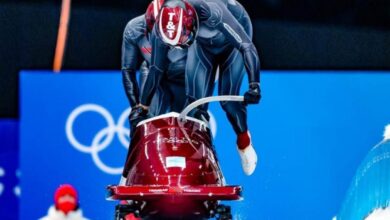Latin America in Short: Peru Changes Its Cabinet And Abdulrazak Gurnah Wins The Nobel Prize
This week Peru changes its cabinet and Abdulrazak Gurnah wins the Nobel Prize for literature. These and more news summarized here .

These were the most relevant news of this week. Photos: Flickr-PalFest
LatinAmerican Post
Listen to this article
Leer en español: Latinoamérica en resumen: Perú cambia su gabinete y Abdulrazak Gurnah gana Nobel del literatura
It is already Friday and as usual, we publish our weekly summary. In politics, Peru changes its cabinet. In culture, Abdulrazak Gurnah wins the Nobel Prize for literature. Regarding the environment, the WHO warns about a lack of drinking water and the EU may be on the way to ban the advertising of fossil fuels. In sports, another big buy in European football from the Arab world. All summarized and explained here.
Pedro Castillo makes a roll in his cabinet
Querida @MirtyVas y los nuevos ministros que se unen al Gabinete Ministerial: Bienvenidos. La nueva etapa en el #GobiernoDelPueblo busca fomentar el diálogo, la gobernabilidad y el trabajo en equipo. Nuestro gran objetivo es luchar por los más vulnerables y vamos a lograrlo.
— Pedro Castillo Terrones (@PedroCastilloTe) October 7, 2021
The brand new cabinet of the new president of Peru, Pedro Castillo, did not last more than 3 months. The leader of Peru Libre called for the resignation of 6 of his 19 ministers, and included his right-hand man (and close to the more extremist movements on the left), Guido Bellido. Now, the formation of the new officials will have a greater participation of women, such as the new Prime Minister Mirtha Vásquez. However, this new cabinet does not have the support of the party that brought Castillo to power and may leave the president completely alone with a Congress hostile to his government.
Abdulrazak Gurnah winner of the 2021 Nobel Prize in Literature
The Tanzanian-born, UK-based writer became this year's eighth winner. During the week, in addition to Abdulrazak Gurnah, the American David Julius and Ardem Patapoutian had received the award in Medicine; the American-Japanese Syukuro Manabe, the German Klaus Hasselman and the Italian Giorgio Parisi received recognition in Physics; and the German Benjamin List and the British David MacMillan in physics. Today, Friday, the name of the winner of the Nobel Peace Prize is expected and that of Economics will close the day on Monday, October 11.
WHO warns about lack of drinking water by 2030
According to the World Health Organization (WHO), by 2030 more than 1.6 billion people will not have access to safe water. This means that only 81% of the world's population will have access to this vital and highly demanded resource, especially in times of pandemic, when it is essential for sanitation.
Without an urgent injection of cash, billions globally are at risk of still being without lifesaving access to safe drinking water, sanitation and hygiene services by 2030, according to a new @UNICEF & @WHO report: https://t.co/QCS9CCEBza#WaterSanitationRights pic.twitter.com/L48eAMskfo
— UN Geneva (@UNGeneva) July 4, 2021
This has alerted specialists from the World Economic Forum (WEF) to find a way to bring drinking water to populations that in less than ten years will have no way of accessing this resource and will be part of the already high percentage of people who each year are victims of the lack of drinking water. This also demonstrates the need for regulations and policies that protect water and put it in the hands of the most vulnerable.
European associations unite for the EU to ban fossil fuel advertising
Necesitamos 1 millón de firmas para que la UE dicte una ley que prohíba la publicidad de combustibles fósiles. Lo conseguimos con el tabaco y ahora también podemos. Apoya esta campaña, firma aquíhttps://t.co/Ti1Ek8C3Mn
— Lorena Ruiz-Huerta (@LorenaRuiz_H) October 5, 2021
More than 20 European associations have taken on the task of collecting signatures to pressure the European Union (EU) to make a decision to ban the advertising of companies that produce fossil fuels, due to the pollution that these pose. One of the great flags of the EU is the environment and its protection, but several associations and organizations are dissatisfied with the lax policies that have been had with large industries, such as pre-control, which is also responsible for millions of tons of carbon dioxide that are emitted annually. 1 million signatures must be collected within a year for the petition to be considered by the European Commission and work on legislation can begin.
Newcastle United was acquired by Saudi Arabia
Premier League club Newcastle United confirmed yesterday that it was acquired by a Saudi Arabian fund. The £ 300 million purchase is controversial because of the kingdom's various human rights abuses, which would be "hidden" by football. The issue of inclusion in soccer is also worrying, considering that a club that promotes LGBT and women's rights would now become from a country whose government vehemently opposes them.
INCREÍBLE
La Premier League autorizó la venta del Newcastle a un grupo de Arabia Saudí y el club se convirtió en el más rico de todo el planeta.
¡La fortuna de sus dueños asciende a 320 mil millones de dólares! pic.twitter.com/FmWUzB9duI
— FOX Deportes (@FOXDeportes) October 7, 2021
However, the Public Investment Fund of Saudi Arabia has ensured that the state will not have any control over the management of the club. Thus, overnight, a regular club becomes the club with the highest purchasing power in Europe.




